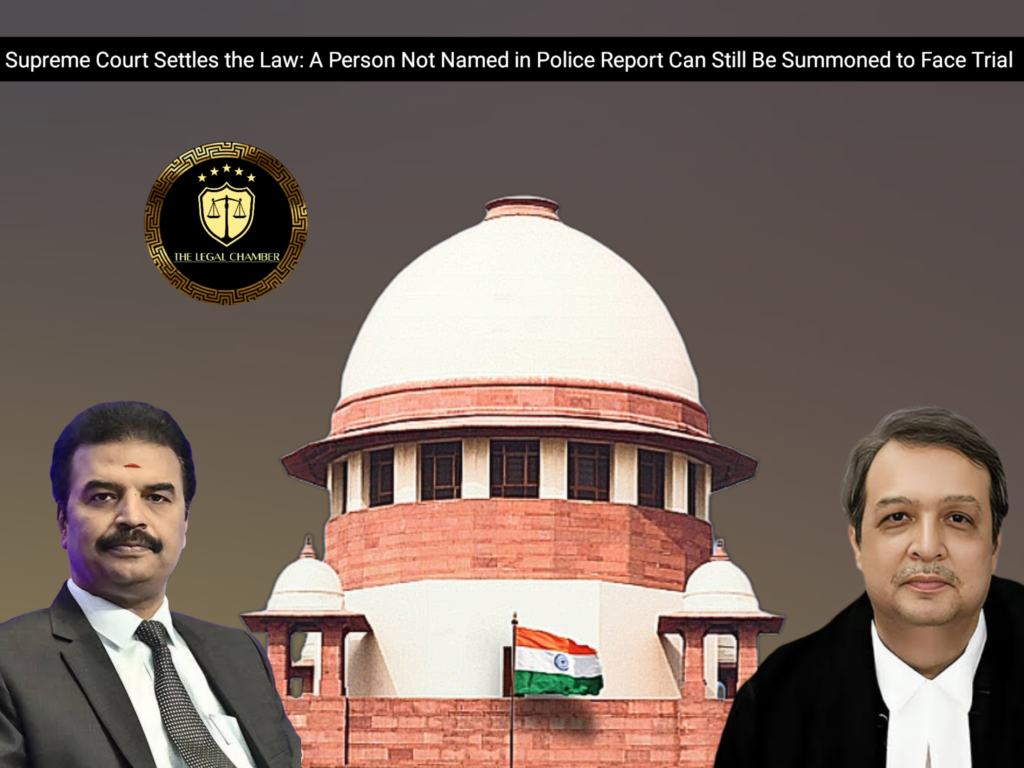
The Supreme Court held that under Section 193 CrPC, a Sessions Court is empowered to summon additional accused persons not named in the police report upon committal of a case, as cognizance is taken of the offence—not the offender—and such power is incidental to the court’s original jurisdiction post-committal. This does not amount to taking “fresh cognizance.
Facts Of The Case:
The case originated from an FIR registered at Police Station Shivali, Kanpur Dehat, concerning the murder and rape of a woman. The initial investigation named one Ajay as the suspect. However, during the probe, the petitioner’s name surfaced based on witness statements and an alleged extra-judicial confession. Despite this, the Crime Branch gave the petitioner a clean chit, and a chargesheet was filed solely against Ajay. Subsequently, the case was committed to the Sessions Court. The complainant (the victim’s husband) then filed an application under Section 193 CrPC before the Sessions Court, seeking to summon the petitioner as a co-accused. After nearly five years, the trial court allowed this application, finding prima facie material against the petitioner and summoning him to face trial alongside Ajay. This order was upheld by the High Court, which relied on the Constitution Bench decision in Dharam Pal vs. State of Haryana. The petitioner then approached the Supreme Court, challenging the summoning order.
Procedural History:
The procedural history began with the trial court allowing the complainant’s application under Section 193 CrPC, summoning the petitioner as an accused based on material in the case diary. This order was subsequently challenged before the High Court through a criminal revision application. The High Court dismissed the revision, upholding the trial court’s order and relying on the precedent set by the Constitution Bench in Dharam Pal vs. State of Haryana. Following this dismissal, the petitioner exercised his final appellate remedy by filing a Special Leave Petition (Crl) before the Supreme Court, which culminated in the present judgment.
READ ALSO :Supreme Court Upholds Rape Conviction, Rules Victim’s Testimony Alone Is Enough
Court Observation:
The Court observed that cognizance is taken of an offence, not the offender, and once a case is committed to the Sessions Court under Section 209 CrPC, it assumes original jurisdiction. The Court clarified that the Sessions Judge is empowered under Section 193 to summon any person, not named in the police report, if prima facie evidence of their involvement exists in the material received upon committal. This power is integral to the court’s duty to discover the true offenders and is not a “fresh cognizance” but an exercise of original jurisdiction incidental to the committal process. The interpretation in Dharam Pal was reaffirmed.
Final Decision & Judgement:
The Supreme Court dismissed the petition, upholding the decisions of the courts below. It affirmed that the Sessions Court was fully empowered under Section 193 CrPC to summon the petitioner as an additional accused based on the prima facie evidence contained within the case record commited to it. The Court mandated that the trial must proceed swiftly, directing the trial court to frame charges and complete the entire trial within six months from the receipt of its order.
Case Details:
Case Title: Kallu Nat Alias Mayank Kumar Nagar vs. State of U.P. and Anr. Citation: [2025] INSC 930 Criminal Appeal No.: Special Leave Petition (Crl) No. 10010 of 2025 Date of Judgement: 5th August, 2025 Judges/Justice Name: Justice J.B. Pardiwala and Justice R. Mahadevan
Download The Judgement Here